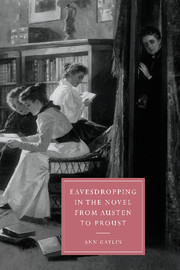Book contents
- Frontmatter
- Contents
- Acknowledgments
- Introduction
- 1 I'm all ears: Pride and Prejudice, or the story behind the story
- 2 Eavesdropping and the gentle art of Persuasion
- 3 Household words: Balzac's and Dickens's domestic spaces
- 4 The madwoman outside the attic: eavesdropping and narrative agency in The Woman in White
- 5 La double entente: eavesdropping and identity in A la recherche du temps perdu
- Conclusion: covert listeners and secret agents
- Notes
- Select bibliography
- Index
Conclusion: covert listeners and secret agents
Published online by Cambridge University Press: 22 September 2009
- Frontmatter
- Contents
- Acknowledgments
- Introduction
- 1 I'm all ears: Pride and Prejudice, or the story behind the story
- 2 Eavesdropping and the gentle art of Persuasion
- 3 Household words: Balzac's and Dickens's domestic spaces
- 4 The madwoman outside the attic: eavesdropping and narrative agency in The Woman in White
- 5 La double entente: eavesdropping and identity in A la recherche du temps perdu
- Conclusion: covert listeners and secret agents
- Notes
- Select bibliography
- Index
Summary
The reader does not hear, he overhears.
Atwood, Negotiating with the DeadIn his dedication of The Secret Agent to H. G. Wells, Joseph Conrad called his novel “a simple tale of the nineteenth century.” Yet although Conrad's novel is set in 1886, with its central event based on an actual attempt to blow up the Royal Observatory in 1894, it is hardly a “simple tale.” Published six years before the first volume of A la recherche du temps perdu, The Secret Agent (1907) explodes nineteenth-century assumptions about narrative, social, and psychological spaces, and about public and private identities, just as, in its experimental telling, it blows apart narrative form. The narrative space – fragmented and out of order – reflects the social world it represents. Domestic ideology, with its separate spheres for gendered activities, no longer obtains. The major eavesdropping scene in the novel stages this altered understanding of spaces and selves. Occurring late in the story and in its telling, covert listening in The Secret Agent is committed not by the novel's professional spies, anarchists, or police agents, but by its central female character, Winnie Verloc. She eavesdrops on her husband and Chief Inspector Heat as they stand in the Verloc parlor and discuss the botched plan to bomb the Royal Observatory at Greenwich. Her secret listening in the family shop takes place after the explosion destroys her simple-minded brother Stevie, and, with him, the fiction of domestic respectability by which she has justified her life.
- Type
- Chapter
- Information
- Eavesdropping in the Novel from Austen to Proust , pp. 167 - 178Publisher: Cambridge University PressPrint publication year: 2003

